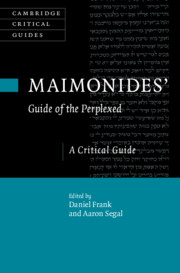Book contents
- Maimonides’ Guide of the Perplexed
- Cambridge Critical Guides
- Maimonides’ Guide of the Perplexed
- Copyright page
- Contents
- Contributors
- Introduction
- Part I Form
- Part II Human Beginnings
- Part III The Creator
- Part IV The Created
- Chapter 8 Creation and Miracles in the Guide
- Chapter 9 The Prophetic Method in the Guide
- Chapter 10 Maimonides’ Modalities
- Part V Human Finitude
- Part VI Human Ends
- Bibliography
- Index
- Cambridge Critical Guides
Chapter 10 - Maimonides’ Modalities
from Part IV - The Created
Published online by Cambridge University Press: 18 June 2021
- Maimonides’ Guide of the Perplexed
- Cambridge Critical Guides
- Maimonides’ Guide of the Perplexed
- Copyright page
- Contents
- Contributors
- Introduction
- Part I Form
- Part II Human Beginnings
- Part III The Creator
- Part IV The Created
- Chapter 8 Creation and Miracles in the Guide
- Chapter 9 The Prophetic Method in the Guide
- Chapter 10 Maimonides’ Modalities
- Part V Human Finitude
- Part VI Human Ends
- Bibliography
- Index
- Cambridge Critical Guides
Summary
The modalities – necessity, possibility, and impossibility – are not topics like the existence of God, creation versus eternity, prophecy, divine attributes, or providence whose “secrets” Maimonides investigates in the Guide. They belong instead to the philosophical and logical framework within which these topics are explored. But they are no less perplexing. The modal terms often differ in meaning in different contexts, depending on whether the subject is physics or metaphysics, and for the falasifa and the mutakallimun. Therefore, in order to address any of the central controversies of the Guide, we must first sort out these modal notions, distinguishing the different conceptions in different contexts.
- Type
- Chapter
- Information
- Maimonides' Guide of the PerplexedA Critical Guide, pp. 184 - 206Publisher: Cambridge University PressPrint publication year: 2021
- 2
- Cited by

